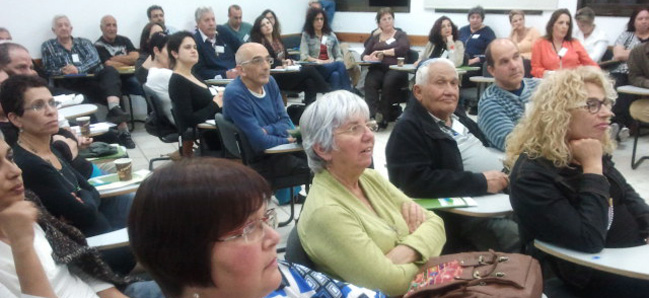
Three new initiatives will help to span the divides in healthcare between Israel’s center and Northern periphery. A new pilot program will help enable people coping with a mental health emergency to recover in the community rather than in a psychiatric hospital. A newly-opened rehab center in the North will help reduce the shortage of such facilities in the Galilee. And women in disadvantaged Northern communities will now receive lactation support to help them breastfeed their infants.
These – and more – initiatives are the result of two SHATIL courses that trained Galilee residents to become agents of change for greater health equity.
The year-long program in the Western Galilee just graduated its second cohort, adding 50 doctors, nurses, physical therapists, psychologists, academics, social activists, lawyers, and others to the cadre of 30 change makers who graduated from last year’s pilot course. Together, they now compose the Northern Health Equity Leadership Network, which is working to bridge the unconscionable gaps in healthcare between the north and center of the country. At the end of 2015, they will be joined by a third group that will be trained in the majority-Arab city of Nazareth.
“When citizens promote programs for bridging gaps and don’t settle for complaining about the ineffectiveness of the authorities, life in Israel looks different,” said Professor Michael Weingarten, M.D., Associate Dean of Bar Ilan University’s Galilee Medical Faculty and a pilot program participant.
Studies show that the number of doctors, nurses and hospital beds, the accessibility of treatment, and even life expectancy is significantly lower in the north than in the center of the country. This project aims to narrow those alarming gaps.
In addition to learning about the gaps in healthcare and the health and medical challenges facing northern residents, the high caliber trainees – both Arab and Jewish – use the resources of the course and the sponsoring organizations to initiate projects that respond to specific issues. In addition to those mentioned above, projects in the works include a women’s health center, a smoking cessation program aimed at Arab youth, a health education program in the schools, and an initiative to determine clear criteria for the provision and location of health services. Each project receives intensive guidance from SHATIL and partner organizations’ experts.
Among the many partners in this program are the Association for Civil Rights in Israel, JDC-ELKA, the Galilee branch of the Ministry of Health, the Galilee Society, Western Galilee Academic College, the Russell Berrie Foundation, The Fine Foundation, AS Securities, and more.
